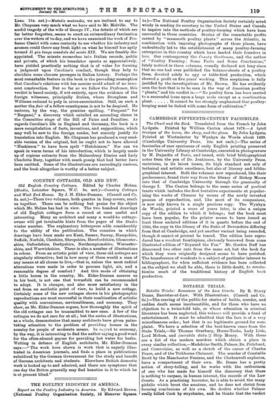CAMBRIDGE FIFTEENTH-CENTURY FACSIMILES.
The Churl and the Bird. Translated from the French by John Lydgate. Printed by William Caxton about 1478.—A lytell treatyse of the horse, the sheep, and the glues. By John Lydgate. Printed at Westminster by Wynkyn de Worde about 1499. (Cambridge University Press. 10s. net each.)—The aeries of facsimiles of rare specimens of early English printing preserved in the University Library at Cambridge, executed in photogravure by M. Dujardin of Paris, and issued, with brief bibliographical notes from the pen of Dr. Jenkinson, by the University Press, maintains, in its latest issues, its high standard not only of technical and artistic excellence, but also of literary and biblio- graphical interest. Both the volumes now reproduced, like their predecessors, found their way from the library of Bishop Moore into that of Cambridge University through the generosity of George I. The Caxton belongs to the same series of poetical tracts which includes the first tentative experiments at popular- ising the works of Chaucer by means of the newly invented process of reproduction, and, like most of its companions, is now only known in a single precious copy. The Wynkyn de Words, printed a score of years later, is also a unique copy of the edition to which it belongs; but the book must have been popular, for the printer seems to have issued at least three undated editions of it in quarto before the end of 1500, the copy in the library of the Duke of Devonshire differing from that at Cambridge, and yet another variant being recorded, though it cannot at present be traced. The edition here repro- duced has a woodcut frontispiece, obviously borrowed from some illustrated edition of "Reynard the Fox." Mr. Gordon Duff has discovered two other cuts from the same set, but the book for which they were originally designed seems to have perished. The transference of woodcuts is a subject of particular interest to bibliographers, for when sufficient evidence has been collected on the subject we shall be able, there is little doubt, to revolu- tionise much of the traditional history of English book production.






















































 Previous page
Previous page